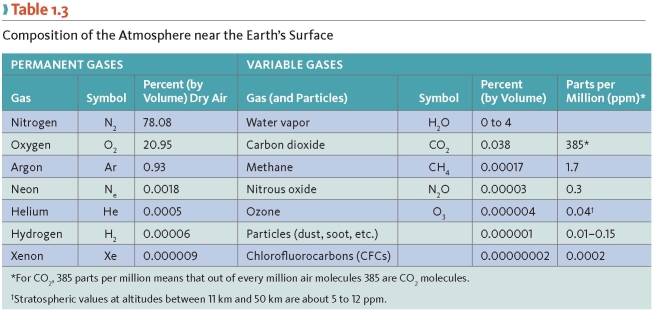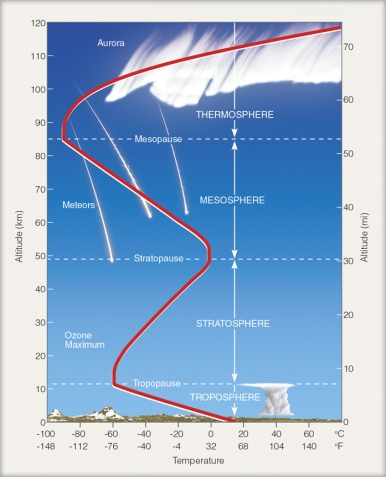Deck 1: The Turbulent Atmosphere
Question
Question
Question
Question
Question
Question
Question
Question
Question
Question
Question
Question
Question
Question
Question
Question
Question
Question
Question
Question
Question
Question
Question
Question
Question
Question
Question
Question
Question
Question
Question
Question
Question
Question
Question
Question
Question
Question
Question
Question

Unlock Deck
Sign up to unlock the cards in this deck!
Unlock Deck
Unlock Deck
1/40
Play
Full screen (f)
Deck 1: The Turbulent Atmosphere
1
Condensation is more likely to occur:
A)when the air cools.
B)when the wind is calm.
C)when winds blow from the ocean over land.
D)at night.
A)when the air cools.
B)when the wind is calm.
C)when winds blow from the ocean over land.
D)at night.
A
2
In a volume of air near the earth's surface,__________ occupies 78 percent
And __________ nearly 21 percent.
A)nitrogen,oxygen
B)hydrogen,oxygen
C)oxygen,hydrogen
D)nitrogen,water vapor
E)hydrogen,helium
And __________ nearly 21 percent.
A)nitrogen,oxygen
B)hydrogen,oxygen
C)oxygen,hydrogen
D)nitrogen,water vapor
E)hydrogen,helium
A
3
The only substance near the earth's surface that is found naturally in the atmosphere as a solid,liquid,and a gas is:
A)carbon dioxide.
B)water.
C)molecular oxygen.
D)ozone.
E)carbon.
A)carbon dioxide.
B)water.
C)molecular oxygen.
D)ozone.
E)carbon.
B
4
The gas that absorbs most of the harmful ultraviolet radiation in the stratosphere is:
A)water vapor.
B)nitrous oxide.
C)carbon dioxide.
D)ozone.
E)chlorofluorocarbons.
A)water vapor.
B)nitrous oxide.
C)carbon dioxide.
D)ozone.
E)chlorofluorocarbons.

Unlock Deck
Unlock for access to all 40 flashcards in this deck.
Unlock Deck
k this deck
5
The gas that shows the most variation from place to place and from time to time in the lower atmosphere is:
A)ozone (O3).
B)carbon dioxide (CO2).
C)water vapor (H2O).
D)methane (CH4).
E)argon (Ar).
A)ozone (O3).
B)carbon dioxide (CO2).
C)water vapor (H2O).
D)methane (CH4).
E)argon (Ar).

Unlock Deck
Unlock for access to all 40 flashcards in this deck.
Unlock Deck
k this deck
6
At the 500 mb level,the amount of oxygen inhaled in a single breath is __________ of that inhaled at sea-level.
A)about the same
B)about one-quarter
C)about one-half
D)about three-quarters
A)about the same
B)about one-quarter
C)about one-half
D)about three-quarters

Unlock Deck
Unlock for access to all 40 flashcards in this deck.
Unlock Deck
k this deck
7
Water vapor is:
A)a gas.
B)a cloud droplet.
C)a rain drop.
D)a snowflake.
A)a gas.
B)a cloud droplet.
C)a rain drop.
D)a snowflake.

Unlock Deck
Unlock for access to all 40 flashcards in this deck.
Unlock Deck
k this deck
8
Where cold surface air is replacing warm air,the boundary separating the different bodies of air is termed a:
A)parallel of latitude.
B)tornado.
C)cold front.
D)warm front.
A)parallel of latitude.
B)tornado.
C)cold front.
D)warm front.

Unlock Deck
Unlock for access to all 40 flashcards in this deck.
Unlock Deck
k this deck
9
At night,when the weather is extremely cold and dry,
A)atmospheric pressure increases with increasing altitude.
B)atmospheric pressure remains constant with increasing altitude.
C)atmospheric pressure decreases with increasing altitude.
D)atmospheric pressure first increases,then decreases with increasing altitude.
A)atmospheric pressure increases with increasing altitude.
B)atmospheric pressure remains constant with increasing altitude.
C)atmospheric pressure decreases with increasing altitude.
D)atmospheric pressure first increases,then decreases with increasing altitude.

Unlock Deck
Unlock for access to all 40 flashcards in this deck.
Unlock Deck
k this deck
10
The word "weather" is defined as:
A)the average of the weather elements.
B)the climate of a region.
C)the condition of the atmosphere at a particular time and place.
D)any type of falling precipitation.
A)the average of the weather elements.
B)the climate of a region.
C)the condition of the atmosphere at a particular time and place.
D)any type of falling precipitation.

Unlock Deck
Unlock for access to all 40 flashcards in this deck.
Unlock Deck
k this deck
11
Much of Tibet lies at altitudes over 18,000 feet where the pressure is about 500 mb.At such altitudes,the Tibetans are above roughly:
A)10% of the air molecules in the atmosphere.
B)25% of the air molecules in the atmosphere.
C)50% of the air molecules in the atmosphere.
D)75% of the air molecules in the atmosphere.
A)10% of the air molecules in the atmosphere.
B)25% of the air molecules in the atmosphere.
C)50% of the air molecules in the atmosphere.
D)75% of the air molecules in the atmosphere.

Unlock Deck
Unlock for access to all 40 flashcards in this deck.
Unlock Deck
k this deck
12
Which of the following weather elements always decreases as we climb upward in the atmosphere?
A)wind
B)temperature
C)pressure
D)moisture
E)all of the above
A)wind
B)temperature
C)pressure
D)moisture
E)all of the above

Unlock Deck
Unlock for access to all 40 flashcards in this deck.
Unlock Deck
k this deck
13
The most abundant greenhouse gas in the earth's atmosphere is:
A)carbon dioxide (CO2).
B)nitrous oxide (N2O).
C)water vapor (H2O).
D)methane (CH4).
E)chlorofluorocarbons (CFCs).
A)carbon dioxide (CO2).
B)nitrous oxide (N2O).
C)water vapor (H2O).
D)methane (CH4).
E)chlorofluorocarbons (CFCs).

Unlock Deck
Unlock for access to all 40 flashcards in this deck.
Unlock Deck
k this deck
14
Referring to Table 1.3: If you were to take a breath of pure oxygen,from a tank,you'd be getting about __________ the amount of oxygen you'd get by taking a normal breath of our atmosphere.
A)one-fifth
B)half
C)twice
D)three times
E)five times

A)one-fifth
B)half
C)twice
D)three times
E)five times


Unlock Deck
Unlock for access to all 40 flashcards in this deck.
Unlock Deck
k this deck
15
Which of the following is most likely associated with fair weather?
A)high pressure area
B)low pressure area
C)a cold front
D)a warm front
A)high pressure area
B)low pressure area
C)a cold front
D)a warm front

Unlock Deck
Unlock for access to all 40 flashcards in this deck.
Unlock Deck
k this deck
16
Which relates to weather rather than climate?
A)The average temperature for the month of January is 28 oF
B)the lowest temperature ever recorded in Frozenlake,Minnesota is -57 oF
C)the foggiest month of the year is December
D)I like the warm,humid summers
E)Outside it is cloudy and snowing
A)The average temperature for the month of January is 28 oF
B)the lowest temperature ever recorded in Frozenlake,Minnesota is -57 oF
C)the foggiest month of the year is December
D)I like the warm,humid summers
E)Outside it is cloudy and snowing

Unlock Deck
Unlock for access to all 40 flashcards in this deck.
Unlock Deck
k this deck
17
Almost all of the earth's weather occurs in the:
A)exosphere.
B)stratosphere.
C)mesosphere.
D)thermosphere.
E)troposphere.
A)exosphere.
B)stratosphere.
C)mesosphere.
D)thermosphere.
E)troposphere.

Unlock Deck
Unlock for access to all 40 flashcards in this deck.
Unlock Deck
k this deck
18
The earth's atmosphere is divided into layers based on the vertical profile of:
A)air pressure.
B)air temperature.
C)air density.
D)wind speed.
A)air pressure.
B)air temperature.
C)air density.
D)wind speed.

Unlock Deck
Unlock for access to all 40 flashcards in this deck.
Unlock Deck
k this deck
19
Since the turn of this century,CO2 in the atmosphere has:
A)been increasing in concentration.
B)been decreasing in concentration.
C)remained at about the same concentration from year to year.
D)disappeared entirely.
A)been increasing in concentration.
B)been decreasing in concentration.
C)remained at about the same concentration from year to year.
D)disappeared entirely.

Unlock Deck
Unlock for access to all 40 flashcards in this deck.
Unlock Deck
k this deck
20
The atmospheric layer in which we live is called the:
A)troposphere.
B)stratosphere.
C)thermosphere.
D)ionosphere.
E)exosphere.
A)troposphere.
B)stratosphere.
C)thermosphere.
D)ionosphere.
E)exosphere.

Unlock Deck
Unlock for access to all 40 flashcards in this deck.
Unlock Deck
k this deck
21
How likely are you to die from a weather-related event?

Unlock Deck
Unlock for access to all 40 flashcards in this deck.
Unlock Deck
k this deck
22
The ozone hole is an actual hole in the atmosphere,a region of complete vacuum.

Unlock Deck
Unlock for access to all 40 flashcards in this deck.
Unlock Deck
k this deck
23
Stratospheric ozone is a health hazard for people with respiratory illnesses.

Unlock Deck
Unlock for access to all 40 flashcards in this deck.
Unlock Deck
k this deck
24
Hurricane winds are generally stronger than tornado winds.

Unlock Deck
Unlock for access to all 40 flashcards in this deck.
Unlock Deck
k this deck
25
Hurricanes inflict most of their damage after crossing from the ocean onto the land.

Unlock Deck
Unlock for access to all 40 flashcards in this deck.
Unlock Deck
k this deck
26
What causes air pressure? Why does air pressure decrease with increasing altitude?

Unlock Deck
Unlock for access to all 40 flashcards in this deck.
Unlock Deck
k this deck
27
Standing at the top of a tall mountain,a breath of air would contain a lot fewer molecules than a breath of air taken at sea level,but the proportion of oxygen in the two breaths of air,relative to the other constituents,would remain the same.

Unlock Deck
Unlock for access to all 40 flashcards in this deck.
Unlock Deck
k this deck
28
Referring to Figure 1.12: There is a lot of mixing and overturning of air in the mesosphere.



Unlock Deck
Unlock for access to all 40 flashcards in this deck.
Unlock Deck
k this deck
29
What does it mean when the air is saturated?

Unlock Deck
Unlock for access to all 40 flashcards in this deck.
Unlock Deck
k this deck
30
Calm,tranquil weather is sometimes extremely hazardous.

Unlock Deck
Unlock for access to all 40 flashcards in this deck.
Unlock Deck
k this deck
31
Turbulent wind shear zones and downbursts are hazards caused by thunderstorms.

Unlock Deck
Unlock for access to all 40 flashcards in this deck.
Unlock Deck
k this deck
32
Describe the relationship between gravity and weight.

Unlock Deck
Unlock for access to all 40 flashcards in this deck.
Unlock Deck
k this deck
33
Heat waves are generally considered to be little more than a nuisance and are not responsible for considerable loss of life.

Unlock Deck
Unlock for access to all 40 flashcards in this deck.
Unlock Deck
k this deck
34
Why does air pressure change much more with vertical distance than it does with horizontal distance?

Unlock Deck
Unlock for access to all 40 flashcards in this deck.
Unlock Deck
k this deck
35
Why is there very little water vapor above the tropopause?

Unlock Deck
Unlock for access to all 40 flashcards in this deck.
Unlock Deck
k this deck
36
Water vapor shows more variation from place to place and from time to time than any other atmospheric gas.

Unlock Deck
Unlock for access to all 40 flashcards in this deck.
Unlock Deck
k this deck
37
Why does rising air produce clouds?

Unlock Deck
Unlock for access to all 40 flashcards in this deck.
Unlock Deck
k this deck
38
Could air pressure ever increase with increasing altitude? Why or why not?

Unlock Deck
Unlock for access to all 40 flashcards in this deck.
Unlock Deck
k this deck
39
Only a tiny fraction of the atmosphere is carbon dioxide.Why is it so important?

Unlock Deck
Unlock for access to all 40 flashcards in this deck.
Unlock Deck
k this deck
40
Under what circumstances might a person breathe stratospheric air? How often is it likely to happen in a student's lifetime?

Unlock Deck
Unlock for access to all 40 flashcards in this deck.
Unlock Deck
k this deck



